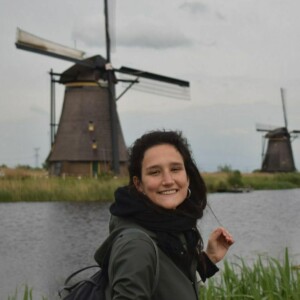
Letizia Pondini
University of Warwick
Project
Can urban air quality be improved through the use of plant associated bacteria?
Supervisors
Dr Hendrik Schäfer, Prof. Gary Bending, Dr Tijana Blanusa
PhD Summary
Over 90% of the UK population is urban and thus facing a range of urban-specific environmental challenges. Green infrastructure can help to mitigate some of these challenges (higher temperatures, increased flooding risks, reduced air quality), but the choice of planting can have a significant impact on the extent of benefits. Plants with certain structural and functional properties (hairy leaves, large leaf areas, high transpiration rate) tend to provide a higher level of services. The role of vegetation in maintaining and improving air quality is undisputed but the underlying mechanisms are not fully understood at present. Bacteria inhabiting the above ground parts of plants, the so-called phyllosphere, have the potential to degrade atmospheric volatile compounds and may contribute to degradation of volatile pollutants and chemicals bound to particulate matter. In this PhD project I will address fundamental aspects of plant-bacterial partnerships and their potential to mitigate air pollutants, like how the presence of leaf hairs affects microbial colonisation of the phyllosphere and how the microbiota interacts with the plant and atmospherically derived pollutants. This will be carried out with plants previously identified as providing a high level of ecosystem services within green infrastructure (Stachys and Salvia spp.). Overall, I will assess whether the extent of ecosystem services delivery by these plants can be enhanced through the air pollutant degradation via partnership with specific microorganisms.
What inspires you
Growing up in the countryside I have been developing a strong connection with natural world and this has been reflected in my interests and studies. It is my concern about the environment that led me to the idea of preserving it for future generations.
Previous activity
I did my undergraduate and Master in Agricultural Sciences at the University of Bologna (IT). During my Master I did a thesis on molecular biology, after my graduation I spent a 4 months period at the University of Wageningen (NL) for an internship about the effects of climate change on agriculture.
Why did you choose doctoral research?
The time I spent abroad gave me the chance to experience what research has to offer on an international level, in a leading institution, working on climate change and future predictions. The choice of the subject, unrelated to my previous experience, was guided by my strong interest in environmental problems which have a massive impact on society and human lives.
Why did you choose CENTA?
I was attracted by the emphasis that CENTA program puts on training students towards the acquisition of transferable and versatile skills. I strongly believe in the importance of keeping my mind open and able to take the opportunities to broaden my horizons, no matter where they come from.
Future plans
Studying at the Warwick University for a CENTA PhD will give me the possibility to cooperate with and learn from people who share my own interests. I believe that studying for this PhD will enable me to pursue a career both in academia or in a company in something related to the environment and nature.
